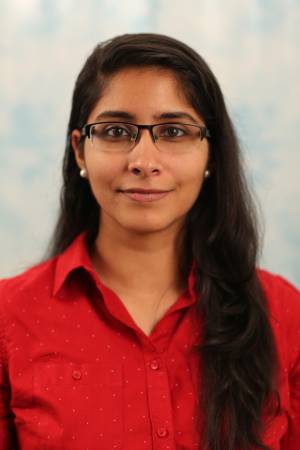Carnegie Mellon University
Robot Deep Reinforcement Learning: Tensor State-Action Spaces and Auxiliary Task Learning with Multiple State Representations
Zoom Link Abstract: A long standing goal of robotics research is to create algorithms that can automatically learn complex control strategies from scratch. Part of the challenge of applying such algorithms to robots is the choice of representation. Reinforcement Learning (RL) algorithms have been successfully applied to many different robotic tasks such as the Ball-in-a-Cup [...]
Raunaq Bhirangi – MSR Thesis Talk
Zoom link: https://cmu.zoom.us/j/93803046130?pwd=dE5LU21lakcxNjBmZ0EvVDdNOWswdz09 Title: Learning Families of Behaviors for Legged Locomotion using Model-Free Deep Reinforcement Learning Abstract: Conventional planning and control of highly articulated legged robots is challenging because of the high dimensionality of the state space, and such conventional techniques normally produce a single point solution. In this work, we present a [...]
Carnegie Mellon University
William Qi – MSR Thesis Talk
Location: https://cmu.zoom.us/j/96923127678?pwd=TWt3Zk5neFUzSlJWUjZEN2F6UVhudz09 Title: Representation Learning for Safe Autonomous Movement Abstract: Mobile robots have become an increasingly common presence in our homes and on our roads. To move safely within these shared spaces, autonomous agents must understand how other dynamic actors behave and how such behavior influences the navigability of the surrounding scene. Towards this goal, we [...]
Carnegie Mellon University
Ryan Coulson – MSR Thesis Talk
Zoom link: https://cmu.zoom.us/j/91138367616 Title: Soft Materials Architectures for Robot Manipulation Abstract: Robot manipulation has been a prolific subject of academic research for several decades - however, today's robotic manipulators have yet to demonstrate an ability to perform robust and versatile dexterous manipulation. This challenge can largely be attributed to a tradeoff between complexity and capability [...]
Carnegie Mellon University
Anish Bhattacharya – MSR Thesis Talk
Zoom link: https://cmu.zoom.us/j/4413360562 Title: Toward Increased Airspace Safety: Quadrotor Guidance for Targeting Aerial Objects Abstract: As the market for commercially available unmanned aerial vehicles (UAVs) booms, there is an increasing number of small, teleoperated or autonomous aircraft found in protected or sensitive airspace. Existing solutions for removal of these aircraft are either military-grade and too [...]
Carnegie Mellon University
Aaron Miller – MSR Thesis Talk
Zoom link: https://cmu.zoom.us/j/95386019509?pwd=cmNnTm9lWWlNbTh1SmQ0RU5PVTBmQT09 Title: Cooperative Perception for Pairs of Self-Driving Cars Abstract: Fully autonomous vehicles are expected to share the road with less advanced vehicles for a significant period of time. Furthermore, an increasing number of vehicles on the road are equipped with a variety of low-fidelity sensors which provide some perception and localization [...]
Carnegie Mellon University
Sara Misra – MSR Thesis Talk
Zoom link: https://cmu.zoom.us/j/3216213856 Title: Learning-based modular framework for environment-adaptive planning in exploration tasks Abstract: Search-based path planning has spawned a number of different solutions using different paradigms and strategies, both generalized and specific to certain problems, representations, and environments. Split into heuristic and non-heuristic based approaches, where heuristic-based approaches, embedded within these approaches [...]
Carnegie Mellon University
Blake Buchanan – MSR Thesis Talk
Location: https://cmu.zoom.us/j/99874277969?pwd=Q1MvczNhWTB4UmF3UXFOMEFtVG1uZz09 Title: Mechanics and Control of Coupled Interactions in Ambient Media Abstract: Many multi-agent systems in nature comprise agents that interact with, and respond to, the dynamics of their environment. For example, fish school based on the fundamental fluid phenomena of vortex shedding, birds shed leading-edge vortices in formation for flocking, and E. coli bacteria [...]
Carnegie Mellon University
Online Inference of Joint Occupancy using Forward Sensor Models and Trajectory Posteriors for Deliberate Robot Navigation
Zoom Link Abstract: Robotic navigation algorithms for real-world robots require dense and accurate probabilistic volumetric representations of the environment in order to traverse efficiently. Sensor data in a Simultaneous Localisation And Mapping (SLAM) context, however, always has associated acquisition noise and pose uncertainty, and encoding this within the map representation while still maintaining computational tractability [...]
Computational Imaging: Beyond the Limits Imposed by Lenses
Virtual VASC Seminar: https://cmu.zoom.us/j/92587238250?pwd=S0paYUVBUXozQkFTclMwRUg0MzBNZz09 Abstract: The lens has long been a central element of cameras, since its early use in the mid-nineteenth century by Niepce, Talbot, and Daguerre. The role of the lens, from the Daguerrotype to modern digital cameras, is to refract light to achieve a one-to-one mapping between a point in the scene and a point on the sensor. This effect enables the sensor to compute a particular two-dimensional (2D) [...]
Beyond ROS: Using a Data Connectivity Framework to build and run Autonomous Systems
Virtual FRC Seminar: Seminar recording: https://cmu.zoom.us/rec/share/x84qF7_q8TlIcpHoyG_DRa58O6i8aaa8hCAW_fEPxEkBGjBVPyzW_lK0YW30RfJ3?startTime=1598551489000 Passcode: qu6)ePH9 Abstract: Next-generation robotics will need more than the current ROS code in order to comply with the interoperability, security and scalability requirements for commercial deployments. This session will provide a technical overview of ROS, ROS2 and the Data Distribution Service™ (DDS) protocol for data connectivity in safety-critical cyber-physical [...]
Learning 3D Reconstruction in Function Space
Virtual VASC Seminar: https://cmu.zoom.us/j/96635002737?pwd=RkxGVlJaUTlhcDdGeVBPcnpTS015dz09 Abstract: In this talk, I will show several recent results of my group on learning neural implicit 3D representations, departing from the traditional paradigm of representing 3D shapes explicitly using voxels, point clouds or meshes. Implicit representations have a small memory footprint and allow for modeling arbitrary 3D toplogies at [...]
Carnegie Mellon University
Machine Learning Parallelism Could Be Adaptive, Composable and Automated
Zoom Link Abstract: In recent years, researchers in SysML have created algorithms and systems that parallelize ML training over multiple devices or computational nodes. As ML models become more structurally complex, many systems have struggled to provide all-round performance on a variety of models. Particularly, ML scale-up is usually underestimated in terms of the amount [...]
Carnegie Mellon University
Computational Contact Modes for Robotics
Zoom Link Abstract: A central theme in robotics is that of robots interacting with the world through physical contact. Whether it is a walking robot or robotic manipulator picking up an object, such as a spoon, we desire robots that physically interact with their environments. One significant challenge in physical robot interactions involves dealing with [...]
Carnegie Mellon University
Data-Driven Robotic Grasping in the Wild
Zoom Link Abstract: Humans can effortlessly grasp a wide variety of objects in diverse environments. On the other hand, robotic grasping has been extremely challenging in practice and is far from matching human dexterity. Despite recent progress in the community, most research is still largely focused on constrained environments like picking individual objects on a [...]
Scaling Probabilistically Safe Learning to Robotics
Abstract: Before learning robots can be deployed in the real world, it is critical that probabilistic guarantees can be made about the safety and performance of such systems. In recent years, safe reinforcement learning algorithms have enjoyed success in application areas with high-quality models and plentiful data, but robotics remains a challenging domain for [...]
Carnegie Mellon University
Routing for Persistent Exploration in Dynamic Environments with Teams of Energy-Constrained Robots
Abstract: Disaster relief scenarios require rapid and persistent situational awareness to inform first-responders of safe and viable routes through a constantly shifting environment. Knowing what roads have become flooded or are suddenly obstructed by debris can significantly improve response time and ease the distribution of resources. In a sufficiently large environment, deploying and maintaining fixed [...]
Compositional Representations for Visual Recognition
Virtual VASC - https://cmu.zoom.us/j/99437689110?pwd=cWxuQkIwWlFFZEk0QkVDUVFiN0lTdz09 Abstract: Compositionality is the ability for a model to recognize a concept based on its parts or constituents. This ability is essential to use language effectively as there exists a very large combination of plausible objects, attributes, and actions in the world. We posit that visual recognition models should be [...]
Sparse Spatial Hashing for Dense 3D Reconstruction
Abstract: Real-world 3D data is locally dense but globally sparse. Therefore, efficient sparse data structures are an essential component of dense 3D perception for computer vision and robotics. We manifest the power of spatial hashing by two typical tasks: dense scene reconstruction and global registration. In the first task, we accelerate volumetric integration and surface [...]
Carnegie Mellon University
Coordinated online multi-robot planning
Abstract: Multi-robot applications frequently seek to employ human operators to direct robot actions online because fully automated planners struggle to encode human expertise or handle the extenuating circumstances that occur during real world operations. However, it is extremely challenging for a human to direct multi-robot teams, especially online, i.e., in real-time. From entertainment to defense, [...]
From kinematic to energetic design and control of wearable robots for agile human locomotion
Abstract: Even with the help of modern prosthetic and orthotic (P&O) devices, lower-limb amputees and stroke survivors often struggle to walk in the home and community. Emerging powered P&O devices could actively assist patients to enable greater mobility, but these devices are currently designed to produce a small set of pre-defined motions. Finite state machines [...]
Sensor Planning for Large Numbers of Robots
Abstract: In the wake of a natural disaster, locating and extracting victims quickly is critical because mortality rises rapidly after the first forty-eight hours. In order to assist search and rescue teams and improve response times, teams of aerial robots equipped with sensors and cameras can engage in sensing tasks such as mapping buildings, assessing [...]
Making 3D Predictions with 2D Supervision
Abstract: Building computer vision systems that understand 3D shape are important for applications including autonomous vehicles, graphics, and VR / AR. If we assume 3D shape supervision, we can now build systems that do a reasonable job at predicting 3D shapes from images. However, 3D supervision is difficult to obtain at scale; therefore we should [...]






















